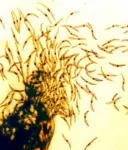(Press-News.org) ROCKVILLE, MD, USA - June 30, 2021 - Researchers from Sanaria® Inc. and the National Institutes of Health (NIH) are making progress in the development of highly protective malaria vaccines.
In an article published today in Nature, Sanaria's PfSPZ-CVac (CQ) vaccine is reported as being safe and protecting 100% of six subjects against a variant malaria parasite three months after their last dose in the company's Phase 1 safety and efficacy trial. This is the first time complete protection against a variant malaria parasite has ever been achieved that long after vaccine administration.
The variant parasite used in the trial is a Brazilian malaria parasite genetically more variant from the African parasites in the vaccine than 700 malaria parasites from Africa. Protection was achieved at a dose that is 20% of the company's first-generation malaria vaccine dosage.
"These results represent extremely important progress, unanticipated by most malaria experts," said Professor Martin Grobusch, Head of the Center of Tropical Medicine and Travel Medicine, Amsterdam University Medical Centers. "Until recently, malaria vaccine developers sought to achieve high-level protection against non-variant malaria parasites, often only two to three weeks after vaccination, with immunity waning thereafter. The finding of 100% protection against variant parasites that are so divergent from the vaccine parasites at three months is unprecedented. This vaccine approach should be advanced now as a potential tool to protect travelers to Africa and further developed for the prevention of malaria in African populations."
The Nature paper also includes results of a second study using PfSPZ-CVac (PYR), which combines Sanaria's PfSPZ with pyrimethine (PYR), a drug used for seasonal malaria prevention in African preschoolers. This vaccine was well tolerated and protected 82% of the 17 subjects to whom it was administered from the Brazilian variant parasites or the African vaccine parasites three months after their last dose.
"We are encouraged by the significant findings reported in this seminal paper, which justify our investment in Sanaria and its systematic, scientifically sound approach to developing the highly protective, cost effective vaccines required to eliminate malaria, a scourge of humanity, particularly for the most underserved on our planet," said Holm Keller, Co-Managing Director, the EU Malaria Fund.
"Sanaria's vaccine development program is designed to produce safe, cost-effective vaccines that provide high-level protection against malaria parasites that cause more than 400,000 deaths annually, primarily in Africa," said Stephen L. Hoffman, Sanaria's CEO. "With this goal in mind, Sanaria and our partners in the International PfSPZ Consortium have pursued a step-by-step approach to maintaining safety, increasing efficacy toward 100% against variant parasites, increasing the durability of efficacy, and decreasing the required vaccine dosage. This study reports huge progress in all four areas."
Sanaria® PfSPZ-CVac is a chemo-attenuated, live whole parasite vaccine in which an anti-malarial drug is co-administered with parasite cells (PfSPZ) to kill them before a clinical infection develops. In the trial reported in Nature, the anti-malarial was either chloroquine (CQ) or PYR and efficacy was measured by controlled human malaria infection (CHMI). In addition to exposure in natural settings in Africa, the company has relied on CHMI of vaccinated and unvaccinated adults to assess vaccine efficacy. This is a rigorous test of malaria vaccines that can be conducted with small numbers of trial participants since 100% of unvaccinated subjects develop malaria.
INFORMATION:
The clinical trial was sponsored by Sanaria Inc. and conducted by the LMIV, NIAID and NIH. The full paper in Nature can be accessed at https://www.nature.com/articles/s41586-021-03684-z
About Sanaria Inc.: Sanaria is a biotechnology company based in Rockville, Maryland (USA) whose mission is development of whole parasite PfSPZ vaccines to protect against malaria. Sanaria's vaccines have been highly protective against malaria in clinical trials in the US, Africa, and Europe. Sanaria's vaccines will be used once cleared by regulatory agencies to prevent malaria in individuals and in combination with other malaria control measures to stop malaria transmission and eliminate malaria in defined geographic regions.
About NIH, NIAID, LMIV: The LMIV was created in 2009 to conduct basic and applied research relevant to malaria immunology and vaccine development, to pursue novel vaccine concepts, or produce prototype malaria vaccines, and to conduct early-phase clinical trials of promising vaccine candidates. Its overarching goal is to develop malaria vaccines that will reduce severe disease and death among African children and pregnant women and will eliminate malaria from low-transmission areas of the world.
Forward Looking Statement
Except for historical information, this news release contains certain forward-looking statements that involve known and unknown risk and uncertainties, which may cause actual results to differ materially from any future results, performance or achievements expressed or implied by the statements made. Such statements include the availability of an effective vaccine, the expectations for conquering malaria, beliefs concerning the suitability of a successful vaccine, and the establishment of a path toward prevention of infection. These forward-looking statements are further qualified by important factors that could cause actual results to differ materially from those in the forward-looking statements.
For business information please email Alexander Hoffman at sanaria@sanaria.com, 301-339-0092.
For more information contact: Jaime Baum, 847 502 3825, jsb@newspros.com or Jamie Moss, 201 493 1027, jamie@newspros.com
Many neurodevelopmental disorders share similar symptoms, such as learning disabilities or attention deficits. A new study from MIT has uncovered a common neural mechanism for a type of cognitive impairment seen in some people with autism and schizophrenia, even though the genetic variations that produce the impairments are different for each condition.
In a study of mice, the researchers found that certain genes that are mutated or missing in some people with those disorders cause similar dysfunctions in a neural circuit in the thalamus. If scientists could develop drugs that target this circuit, they could be used to treat people who have different disorders with common behavioral ...
In 1934, physicist Eugene Wigner made a theoretical prediction based on quantum mechanics that for 87 years went unseen.
The theory suggested how a metal that normally conducts electricity could turn into a nonconducting insulator when the density of electrons is reduced. Wigner theorized that when electrons in metals are brought to ultracold temperatures, these electrons would be frozen in their tracks and form a rigid, non-electricity conducting structure -- a crystal -- instead of zipping around at thousands of kilometers per second and creating an electric current. Since he discovered it, the ...
Researchers have found that eating disorder behaviors, such as binge-eating, alter the brain's reward response process and food intake control circuitry, which can reinforce these behaviors. Understanding how eating disorder behaviors and neurobiology interact can shed light on why these disorders often become chronic and could aid in the future development of treatments. The study, published in JAMA Psychiatry, was supported by the National Institutes of Health.
"This work is significant because it links biological and behavioral factors that interact to adversely impact eating behaviors," said Janani Prabhakar, ...
Neuroscientists at UCL have, for the first time, identified abnormalities in the way memories are 'replayed' in the brains of people with schizophrenia; researchers say the pathbreaking study provides an entirely new basis for explaining many of the condition's core symptoms.
Schizophrenia is a serious and debilitating mental disorder characterised by episodes of psychosis. Symptoms include hallucinations (typically hearing voices), delusions, and disorganised thinking. It affects around 20 million people globally, though the exact cause is unknown.
In the study, published in the journal Cell, researchers used state-of-the-art ...
A new study by investigators from Brigham and Women's Hospital examines the associations between wealth mobility and long-term cardiovascular health. The multidisciplinary study borrowed methodology from the field of economics to analyze longitudinal changes in wealth. The team's results indicate that negative wealth mobility is associated with an increased risk of cardiovascular events, while positive wealth changes are associated with a decreased risk of cardiovascular events. Their results are published in END ...
WHAT:
Two U.S. Phase 1 clinical trials of a novel candidate malaria vaccine have found that the regimen conferred unprecedentedly high levels of durable protection when volunteers were later exposed to disease-causing malaria parasites. The vaccine combines live parasites with either of two widely used antimalarial drugs--an approach termed chemoprophylaxis vaccination. A Phase 2 clinical trial of the vaccine is now underway in Mali, a malaria-endemic country. If the approach proves successful there, chemoprophylaxis vaccination, or CVac, potentially could help reverse the stalled decline of global malaria. Currently, there is no vaccine in widespread use ...
What The Study Did: This crossover trial found that perceived breathing resistance at peak exercise is uniquely and significantly elevated when exercise stress testing (EST) is performed while wearing a mask. Performing EST with a mask yielded lower peak exercise oxygen uptake and heart rates as compared with no mask. However, each experimental condition resulted in peak exercise values that generally remained within normal limits, and no EST required termination due to clinically indicated safety concerns. Thus, although it is possible that wearing a mask exerted a physical limitation on exercise capacity, the clinical relevance of such a possibility is not supported by these data.
Authors: Matthew Kampert, D.O., M.S., ...
What The Study Did: Researchers in this randomized clinical trial found that a large proportion of patients who canceled visits and procedures early in the COVID-19 pandemic didn't reschedule once reopening occurred. A single message targeted directly to these patients didn't affect the return to in-person visits within a month but it resulted in a small increase in re-engagement through telemedicine and rescheduling of future visits.
Authors: Anne R. Cappola, M.D., Sc.M., of the Perelman School of Medicine at the University of Pennsylvania in Philadelphia, ...
What The Study Did: National survey data were used to estimate how common psoriasis is among adults in the United States and how this has changed since 2003.
Authors: April W. Armstrong, M.D., M.P.H., of the University of Southern California in Los Angeles, is the corresponding author.
To access the embargoed study: Visit our For The Media website at this link https://media.jamanetwork.com/
(doi:10.1001/jamadermatol.2021.2007)
Editor's Note: The article includes conflicts of interest disclosures. Please see the article for additional information, including other authors, author contributions and affiliations, conflict of interest and financial disclosures, ...
What The Study Did: Researchers investigated the association between a midlife change in wealth and the risk of cardiovascular event after age 65.
Authors: Muthiah Vaduganathan, M.D., M.P.H., of Brigham and Women's Hospital Heart & Vascular Center and Harvard Medical School in Boston, is the corresponding author.
To access the embargoed study: Visit our For The Media website at this link https://media.jamanetwork.com/
(doi:10.1001/jamacardio.2021.2056)
Editor's Note: The article includes conflict of interest disclosures. Please see the articles for additional information, including other authors, author contributions and affiliations, conflicts of interest and financial disclosures, and funding and support.
INFORMATION:
Media ...

